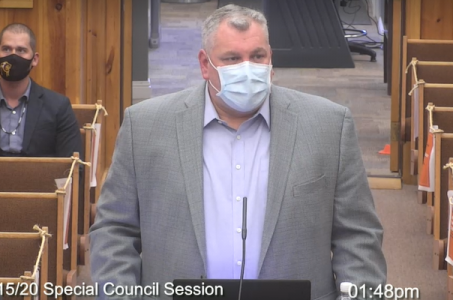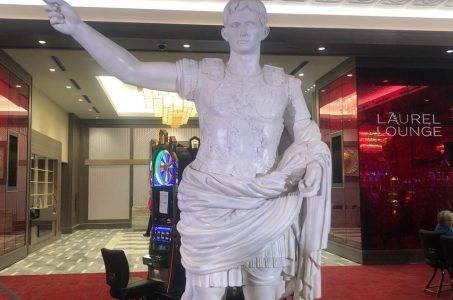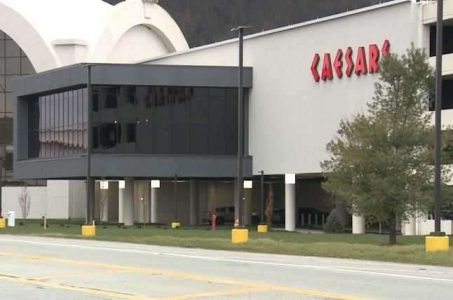Eastern Band of Cherokee Indians Approve Caesars Southern Indiana Purchase
Posted on: December 22, 2020, 01:22h.
Last updated on: December 23, 2020, 08:15h.
Two days after the Eastern Band of Cherokee Indians tribal council tabled a decision to purchase Caesars Southern Indiana, they reversed course. The sovereign nation’s elected officials held a special meeting not publicized on its website to approve – by a reportedly narrow margin – the purchase at up to $280 million.

On Thursday, the council voted to approve the spending plan. That’s according to the Facebook site for the Cherokee One Feather, the official newspaper for the tribe. The publication did not post the article on its website.
The Smoky Mountain News reported on the decision. It noted a close vote but did not indicate a tally. According to that outlet, the session was available only to tribal members through a Microsoft Teams link, and not through its official streaming page on the EBCI website.
The vote took place after that, and also was not available on the tribe’s site. In addition, a video archive of the Dec. 15 meeting has also been pulled from the EBCI website.
According to discussions from the Dec. 15 meeting, the tribe had a Dec. 21 deadline to reach an agreement with Caesars Entertainment on the deal. Last month, it secured an exclusive 45-day negotiating window after it submitted the top bid, according to Principal Chief Richard Sneed’s comments at that meeting. He said EBCI beat out 20 other entries for that right.
The tribe has approved the creation of a limited liability company to purchase and operate commercial casinos.
Agreement Reached on Funding
Sneed has previously declined to comment on the potential acquisition. Caesars officials have not returned messages seeking comment, nor has the Las Vegas-based gaming company officially announced the sale.
Under the plan, EBCI would spend $120 million of tribal funds and borrow the remaining $160 million to purchase the casino operations. The EBCI council had also previously approved funding for due diligence for the Caesars’ purchase.
At the Dec. 15 meeting, several council members raised concerns about the use of five tribal funds for the purchase. That included dipping into a sinking fund set aside for debt repayment, as well as an endowment fund that Council Member Chelsea Saunooke found troublesome.
That is set up for the long-term success of the tribe, and it has to grow to the level of two times the operational budget of the tribe,” she said. “I’m not comfortable with us having an operational budget of X amount of dollars and we only have 18 percent in that endowment.”
According to the One Feather’s Facebook page, the agreement was amended to state: “The Tribe will identify the most advantageous funding mechanism to make the equity contribution.”
The tribal publication did not disclose the vote on that measure.
Why Caesars Must Sell
Caesars Entertainment must sell the southern Indiana casino as a result of the Eldorado Resorts takeover of the company. When Indiana Gaming Commission members approved the $17 billion deal in July, they stipulated the company must move three of its five casinos. Four, including Caesars Southern Indiana, consistently rank among the top five in adjusted gross revenue, according to IGC monthly records.
In October, Caesars announced the sale of Tropicana Evansville to Twin River Worldwide Holdings, now known as Bally’s. Last month, the company received an extension from the IGC to sell Horseshoe Hammond until Dec. 31, 2021. However, the current deadline remained in place for the company to find a buyer for Caesars Southern Indiana.
The commission will also have to approve the sales. While Caesars must sell the casino operation, Vici Properties, a publicly traded gaming real estate investment trust, will continue to own the property.
The divestiture comes about a year after the company transformed the property. It spent $90 million to move from its anchored riverboat to an 80,000-square-foot land-based venue.
It’s also uncertain if Caesars will maintain management, or if the tribe will need to partner with another operator. Caesars currently operates EBCI’s two casinos in western North Carolina.
The property also includes three restaurants, an entertainment hall, a 503-room hotel, and a nearby golf course.
Cherokee Leaders Seek New Revenues
EBCI leaders say looming competition threatens their tribal gaming business. Its two casinos have enjoyed more than two decades of exclusivity in the region. However, casino gaming will be coming to nearby Virginia, likely within the next year, and a competing tribe may open a casino in North Carolina that could cause a loss of up to $100 million in revenue, Sneed has previously told council members.
Sneed, in an e-mail response to questions from Casino.org last month, said commercial gaming can help fill that void.
“Our objective is to be able to offer the same benefits that we enjoy now to the next seven generations of Cherokees,” he said. “Our top 3 priorities are Health Care, Education (Primary, Secondary, and Post-Secondary) and Housing.”
Under Indiana gaming law, the EBCI LLC can only direct 25 percent of a casino’s revenues back to the tribe. However, the LLC could use the remaining funds to help fuel additional commercial growth.
At the Dec. 15 meeting, Sneed told council members the tribe would need at least three properties of similar scope in order to offset the anticipated losses.
EBCI Members Split on Commercial Gaming
Reaction within the EBCI to the news of the pending purchase of the Caesars casino was mixed.
Evan Watty posted on the One Feather’s Facebook page that the decision to venture into commercial gaming sets the tribe up for the long-term.
“Funding programs like healthcare and housing are really important right now,” Witty posted. “Plus, smaller things like having graves dug for free, wells and city water services for free, the list goes on and on. How isn’t that helping the people?”
Kellie Lee Davis, though, wondered if the tribe could find a better use for that money.
“Why not put that money into your people directly?” Davis wrote. “Fix your lands, clean up the streets, pay your employees who took pay cuts their money back.”
Related News Articles
Caesars Agrees to Sell Southern Indiana Casino to Cherokees for $250 Million
San Manuel Buys 40% Stake in Glitzy Orange County Resort
Most Popular
Tropicana Las Vegas to be Imploded, Tentative Date Set
VEGAS MYTHS BUSTED: Golden Gate is the Oldest Casino in Vegas
Most Commented
-
End of the Line for Las Vegas Monorail
— April 5, 2024 — 90 Comments
















Last Comment ( 1 )
Can you play online for free or for real money sharonewalker